 |
Interviews
Catholic Family News editor John Vennari interviews
Atila Sinke Guimarães on his book Will He Find Faith?
Published in CFN, July 2007
JV: Please tell us about your new book Will He Find Faith? and how it fits into your 11-volume Collection, Eli, Eli, Lamma Sabacthani.
ASG:
This recently released book starts to analyze the fruits of Vatican II. In the collection Lamma Sabacthani, the first volume, In the Murky Waters of Vatican II, proved that the letter of the Council – the way the documents were written – is generally ambiguous and at times contradictory. Therefore, the texts can be interpreted in different ways. For example, on the one hand, based on Council documents, progressivists argue that all religions lead to salvation. On the other hand, based also on Vatican II texts, conservatives say that outside of the Church there is no salvation. This is just one example of clear contradiction. Based only on the texts, you can’t clarify anything.
So, to interpret the texts, we must know the spirit of the Council and its fruits. The normal rule is this: When a law is not clear, you study the spirit of the law, that is, the intention the legislator had in writing the law. Applying this rule, I published two volumes analyzing the spirit of those who wrote the documents of Vatican II. What I found was that this spirit is so adverse to the Church’s 2000-year-old way of governing, teaching and sanctifying that it actually reveals an intention to destroy her. For this reason, I called these two volumes Animus Delendi I and Animus Delendi II, that is, Desire to Destroy I and II. I think that this animus is the prism through which the texts of the Council should be analyzed.
Now, TIA has published Will He Find Faith? which is Volume VI and the fourth to be printed. It is the first book of the series that analyzes the fruits of Vatican II. In this collection I only analyze the fruits of Vatican II in the realm of Dogmatics. I do not touch Morals, Canon Law, Exegesis, Liturgy, etc. So, this book, the first to analyze the fruits, deals with the fundamentals of the Catholic Faith that have been inverted since the Council. The volumes to follow will deal with the inversion of the concepts of God, Creation, Original Sin, Redemption, and the Church. With the fruits analyzed, we will have the spirit and the fruits that allow us to interpret and judge Vatican II.
This is how Will He Find Faith? fits into the ensemble.
JV: Why didn’t you publish volumes II and III?
ASG:
I don’t know if I will have the time or financial means to publish the whole collection. Thus, I skipped them in order to publish volumes IV and V, and the others that I consider indispensable. If Our Lady will provide the health and material means to put them all out, I will publish the missing volumes.
JV: What do you mean by your observation in the book that the Faith was always an objective ensemble of truths, but since the Council, it is considered subjective?
ASG:
God is an objective reality. He is the most objective reality that exists, since He is the One Who created everything and maintains their existence. If you consider that the sun is objective because you can see it, feel its heat and benefit from its light, with how much more reason you should consider the One who created the sun as objective.
Now then, this most objective invisible Being decided to make Himself known to men. He also allowed us to be part of His plans in History in order to permit us to come closer to Him and merit eternal life with Him. To this purpose, He revealed Himself to men. This divine revelation is consequently objective also.
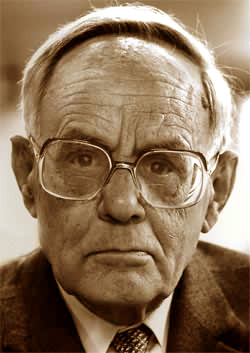
Theologians like Rahner, above, defended Divine Revelation is subjective |
But some weak men said: “It is too hard to believe in an invisible God.” So, to mercifully provide for this need of human nature, He became incarnate; He made Himself visible to us, accessible to us, and like unto us. That is, He became still more objective. As God-Man, Jesus Christ confirmed and completed God’s revelation, giving us all the necessary truths we need to believe in order to accomplish our mission on earth.
Further, He founded the Catholic Church to which He gave special gifts to correctly keep and interpret the ensemble of truths He left us as His legacy.
The ensemble of dogmas that the Church teaches synthesized in the Creed is the most objective vision any man can have of God in this life. It is an objective and external reality to which we must adhere with our intelligence and will. Being faithful to this mysterious light of the faith — lumen fidei — we can reach lumen gloriae, the light of beatific vision.
This was the objectivity of Faith known by every Catholic.
Vatican II virtually denied this notion when in its documents, it accommodated the thesis that divine revelation is not an objective ensemble of truths, but an internal sentiment in the heart of each person. This is a subjective notion of revelation, which necessitates a subjective faith. You know that this was the fundamental error of Modernism, duly condemned by St. Pius X in the Encyclical Pascendi.
Notwithstanding, you see famous theologians such as Frs. Karl Rahner, Yves Congar, Joseph Ratzinger, Marie-Dominique Chenu, and several others who played a decisive role at the Council defending that divine revelation is subjective. They are quoted in this book.
These two concepts of the Catholic Faith are, then, in total opposition.
JV: What do you mean by the Faith now being relative rather than absolute?
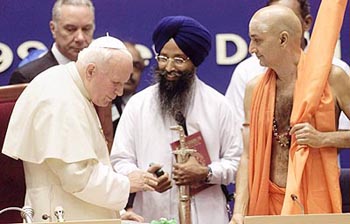
The Council affirmed a relative concept of Faith.
Above, JPII meeting Hindu and Buddhist religious men |
ASG: Absolute is what suffices unto itself. God is the Absolute par excellence, He suffices unto Himself because He does not depend on anyone. The ensemble of the truths revealed by God, preserved and explained by the Catholic Church, is also absolute. It does not depend on anything that non-Catholics might say about God, Jesus Christ, Our Lady, the Church, etc. These people can reject the Catholic Faith, they can mock it, persecute it, but this does not change its marvelous and untouchable veracity. Our Catholic Faith is true because it comes from God; it is absolute because it does not rely on any human opinion.
Now then, Vatican II proposed a different thing: We Catholics have “our truth,” but Protestants, Monophysites, Jews, Buddhists, Hinduists, Muslims, Animists, even Masons and Atheists also have “their truths.” Each one would have its own truth that should merge together in order to find the “whole truth.” This is a relative concept of the faith, and not the absolute concept the Church taught us until the Council.
It is a total inversion. Again, we are facing two opposite concepts of Faith.
JV: What about the universality of the Faith, valid for all men rather than valid for particular situations?
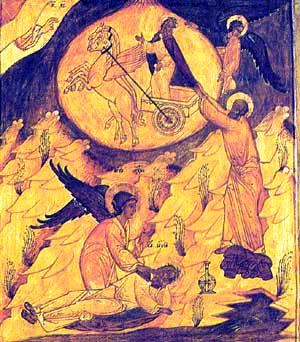
Elias was taken to Heaven to be witness to the immutability of God's doctrine |
ASG: St. Vincent of Lerins, defining the Catholic Faith, said that it is the ensemble of truths that was believed semper, ubique, ad omnibus in the Church, that is, always, everywhere and by everyone. This characterizes the universality of our Holy Faith.
We know as a truth revealed in the Scriptures that Enoch and Elias were taken alive from this earth, are living somewhere, and will return to convert the Jews and fight the Antichrist in the last battles of History. Why were they taken from this earth? To come again and give testimony to what they learned. At the end time, they will sustain the same truths that they received from God.
This is a strong proof that the same revealed truths they received are valid semper, ubique ad omnibus. God is keeping these two Prophets alive to show that at the end, He will teach the same thing as He taught at the beginning. That is, the Catholic Faith is universal and does not change.
On the contrary, Vatican II supposes that the truths of the Faith are adaptable to History. They were valid for the times and situations in which they were defined, but not forever. Today the Conciliar Church has already adapted many points directly or indirectly related to the Faith to new situations:
- It abolished the sacrificial character of the Mass and changed its rubrics, the notion of Eucharist, and the doctrine of justification to please the Protestants;
- With collegiality, it changed the doctrine of the Petrine Primacy and Papal Infallibility to please the Schismatics;
- It changed the exegesis of Scriptures and the notion of the Messiah to please Judaism;
- It set aside Catholic spirituality and asceticism to adopt Buddhist and Hinduist mysticisms;
- It mixed the worship of the Saints with practices of Animism;
- With the notion of People of God, it stressed democracy in the Church, and promoted the “human rights of the French Revolution, calling for liberty of all religions before the civil law to please the Masons;
- It even changed many points of Catholic Social doctrine to please the Communists.
Even if some of these fields are not directly related to the Faith, they are indirectly associated. For example, when one practices a spiritual exercise of Buddhism, one implicitly accepts the Pantheist notion of god proper to this philosophy.
Before the Council, Catholics learned that they should shed their blood to maintain the Catholic Faith. Now, the Faith is only admitted in some cases. As a general rule, it is being immolated to promote the union of religions – a Panreligion, and the union of nations – the Universal Republic.
JV: How has the expression of the Faith changed from being based on and adapted to History rather than being based on immutable dogma?
ASG:
Consider an example, Original Sin. It is a fundamental dogma of the Catholic Faith. Because of the offense made to God by the sin of Adam, Redemption became necessary. The reason is clear: Since the offended Person was infinite, the offense was infinite. Therefore, only a God whose action has infinite merit could make reparation for the guilt of Adam. But this God also needed to be a Man, otherwise humankind could not make expiation. So, we have the need of the Incarnation and the Redemption.
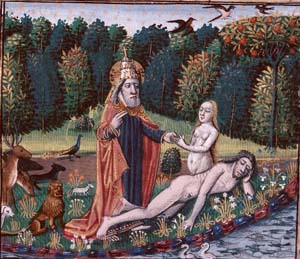
Out of human respect progressivists affirm the description of Genesis is a myth |
This dogma – Original Sin – was revealed in Genesis. It remained the same for about 5,000 years until Modernism, and then Progressivism, questioned it. What was the grounds for this questioning? It was the idea that Catholic dogma should follow the progress of History, the progress of Science. So, when Charles Darwin published his Origins of Species, which pretended to be scientific, innumerable Catholics started to tremble out of human respect.
To accommodate Evolutionism, modernist theologians opposed the description of Genesis and were duly brought to a halt by the Biblical Commission of St. Pius X (1909), which affirmed that Genesis must be interpreted literally. In the ‘30s and ‘40s, Progressivism disregarded that condemnation and many of its theologians again contested the description of Genesis. Vatican II covered for that wrong position. Thus we are now supposed to picture Adam not as a perfect man created by God in His image and likeness, but as an unruly orangutan that was becoming a man and had some embryonic ideas sprouting in his brain. If this is so, the importance of the dogma of Original Sin fades away. How can such a primate offend someone? But, if original sin does not exist, then Redemption loses its meaning. You see how adaptation to the historical progress of science can tear down the Faith.
Today we know that Darwinism is a theory that lost any scientific credibility. Neo-Darwinism tried to save Darwinism from complete ruin, but it also collapsed. I read some years ago that the whole theory of evolution is considered by serious scientists at most as a religion that survives because of the belief of its followers, but it cannot be considered a science.
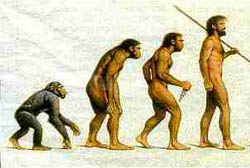
Progressivism adopts Darwin's theory of evolution |
Now, I ask: If Progressivism was so concerned about scientific precision and Evolutionism is not scientific, why don’t its theologians return to the description of Genesis? Progressivists do not return because they are not honest. Their pretended concern for scientific truth was just a pretext to change the dogma.
The tendency to adapt the Catholic Faith to science entails a two-fold mistake. First, science, inductive by nature, is always changing. To link Faith to the progress of science is to promote its very destruction.
Second, faith is to believe in something that is above human reason, which we do not understand. Do you remember the scene when Our Lord told the multitude: Unless you eat the flesh of the Son of Man and drink His blood, you do not have life within you. (John 6:53-56) The pragmatic Jews went away thinking that He had lost His mind. Even the Apostles for a while were affected due to human respect. Then, fortunately, the Apostles believed in His words without understanding them. So also do all Catholics throughout History to this date. We believe because God told us to believe. We will understand this after death. What has this mystery to do with history or science? Absolutely nothing.
Faith is incomparably superior to History and Science, and even when it apparently contradicts them, it is true.
JV: Some readers would take issue with your statements: “Vatican II virtually denied the Faith as an objective ensemble of truths; Vatican II proposed truth as more relative than absolute; and Vatican II supposed that truths of the Faith are adaptable to history.” They would ask: “Where in Vatican II are these errors put forward explicitly?”
ASG:
When I say, “Vatican II virtually denied this, proposed that, or supposed that,” I mean that its documents opened the doors for those errors. I am not trying to say that Vatican II explicitly denied the Faith as objective, absolute, etc. As a fruit of Vatican II, the Faith as absolute, objective, etc. has been largely denied: this is the point of my book. There is a difference between the two statements. It is the difference between the seed of a tree and the grown tree producing its fruits.
I am answering you with the presupposition that the texts of Vatican II are ambiguous, as I tried to demonstrate in Volume I, In the Murky Waters. So, if some of the readers of CFN do not share this presupposition, they can read that book to see if they will reach the same conclusion. If they agree with the presupposition, then they can easily follow my method. That is, to study the spirit and fruits of Vatican II in order to understand its texts.
Incidentally, Paul VI, who is perhaps the principal architect of Vatican II, compared it to a spring that became a river. Then he said that what counts is not so much to look back to the Council itself, but to its legacy. I agree with Paul VI. I quoted this statement in the frontispiece of In the Murky Waters.
In this book, Will He Find Faith? I am starting to study the fruits of Vatican II. The ensemble of the fruits and spirit of the Council will give us the two correct lenses we need to read the texts. Meanwhile I am describing the whole tree, or if you prefer, the river that Paul VI spoke of.
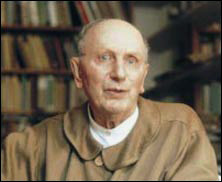
Yves Congar: revelation is subjective |
Now, what is the better way to prove that the Council wanted to express the notion that the Faith is subjective: To make my own interpretation of Dei Verbum, quote some unclear texts regarding conscience in Gaudium et spes, and highlight other ambiguous statements on the presence of God in all men and in all religions?
Or to quote Card. Yves Congar who helped write 12 of the 16 final documents of Vatican II and stated that Vatican II’s theologians adopted the modernist notion that revelation is subjective? Since this is what Congar says, I think we should take this into the highest consideration. He is not a traditionalist making accusations against the Council. He is one of the thinkers who wrote those ambiguous documents. He knows what they are meant to express. His statement sheds light on the obscure texts.
Analogously, in this book I quote numerous scholars, all of them in favor of Vatican II, who affirm that the faith is subjective, relative, dependent on History, etc. They, who are progressivists, defend these things. I just placed their statements together so that we can have a picture of the ensemble.
JV: You have a considerable section of the book dedicated to the development of Modern Philosophy. Why is this important?
ASG:
Progressivists say that they want to adapt Catholic theology to Modern Philosophy. They not only say this, they do it. Indeed, they are changing all theological concepts — God, revelation, redemption, faith, grace, justification, eternal life, etc. — to correspond with Modern Philosophy. But they do not follow just one philosopher, but many. So, unless you analyze the ensemble of Modern Philosophy, you cannot grasp the whole of this adaptation. You cannot accuse them of error. They will play hide-and-seek with you.
Instead of catching each fish with an individual hook — trying to identify the error of this progressivist author with that particular philosopher – the solution is to catch them all with a net. You have to find the common denominator of Modern Philosophy and show that this is what progressivists want to adapt to.
That is what I try to do: make an analysis of the ensemble. For this purpose, I based my study on known Catholic scholars who wrote histories of philosophy. I summarized them and made my point.
What is this common denominator? It is the notion that there is no substantial difference between God and creation. God supposedly is immanent in creation and would be freeing Himself from this prison through a process of cosmic evolution. This is the base of all Modern Philosophy, all the schools, be they spiritual or materialist, monist or dualist, organic or dialectical.
If you analyze ecumenism and inter-confessional dialogue, you see that for Progressivism, God is speaking inside of each person and each religion because He is immanent to everything. If you analyze adaptation of the Church to the modern world, you see that it is the denial of the Church as transcendent to the world. She should enter the world and be immanent to it. If you analyze the notion of Heaven, you see that for Progressivism, when a man dies he does not go to a transcendent place to share the life of God, the Transcendent Being. Instead, man is reinserted in the cosmos and returns to live as part of an energy that is becoming increasingly perfect. And so on. Immanentism explains the philosophical background of Progressivism.
JV: Your book deals with the ambiguous phrase “theology of Communion,” often heard by progressivists since the Council. Please explain what this means.
ASG:
When one hears the word communion, if he is a Catholic, he thinks naturally about receiving Communion at Mass, that is, as synonymous with the Eucharist. Thus, the study of the Eucharist that was made in the past is rightly called theology of Communion, or Eucharistic theology. It is part of the theology of the Sacraments, which belongs to Dogmatic Theology with important reflections in Worship and Liturgy.
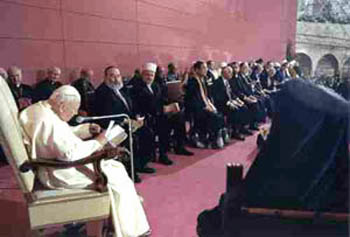
Above, JPII seeking "communion" with Jews at Assisi
|
The novelty came when a group of scholars linked to the New Theology – Nouvelle Theologie – decided to change the focus of the whole Catholic Religion from being first and foremost the Faith in order to become first and foremost Charity. For them, to achieve eternal salvation the most important thing is to love, even if you don’t believe in all truths of the Catholic Faith. To love whom: God or someone else? They say that when you sincerely love your neighbor or some group of persons, you already love God. It is not necessary to say or think: “I love God.” It is implicit in your love for another. So, the general love of one another in a community produces a common union, or communion.
Communion thus takes on a different meaning: it is the ensemble of the faithful united and living this mutual love. When this union takes place during a religious ceremony, a Mass, they say that God is really present in it. It is a deliberate confusion with the real presence of Our Lord in the Blessed Sacrament. Instead of trying to prevent this confusion, they stress it by calling such communitarian union, the Eucharist. They also call the Mass, the Eucharist. A progressivist no longer says, “I am going to a Mass,” rather he says, “I am participating in a Eucharist.” Then, this theology of communion becomes synonymous with Eucharistic theology.
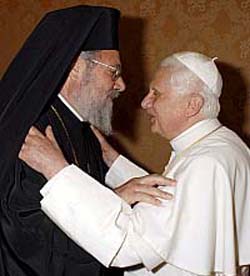
Benedict XVI embraces a Schismatic: "Communion"
|
Next, this theology of love is applied to ecumenism and inter-religious dialogue as well. According to the progressivist current, schismatics, heretics, Jews, pagans, and even atheists do not need to accept the ensemble of truths that characterizes the Catholic Faith. They just need to love, to agree to seek common points with others and find a universal unity. This final unity of all religions is meant to emerge from love, not from a doctrinal agreement.
These are the basic notions about these three synonymous expressions: Theology of love, theology of communion and Eucharistic theology. In this book I deal with the topic of communion more deeply, presenting other facets of it and due documentation.
What is wrong with this concept of communion? Everything is wrong. Our Religion is based upon the Catholic Faith, not on an indiscriminate love for others. I think that in previous answers I have already sufficiently emphasized the importance of Faith as a reflection of God. First, we love God by adhering to the truths of our Catholic Faith; then, we extend this love to our neighbors, inviting them to do the same.
Love must follow Faith, just as the will and sentiments must follow the intelligence.
JV: To close, can you tell us the meaning of the title, Will He Find Faith? Also, the picture on the cover, Giotto’s painting of Our Lord raising Lazarus from the dead?
ASG:
Will He Find Faith? was a question that Our Lord posed to the Apostles when He warned them about the corruption of the end times. He asked the question, but did not answer, which is a way to say: “Behold, He will hardly find Faith.” Since this book studies the general negation of the fundaments of the Catholic Faith, I thought it appropriate to use the same question.
This title does not mean that I think we are in the end times. I believe that a new era, the Reign of Mary, will come to fulfill the plans of God in History. But we live in an epoch that has many similarities with the end times. The most flagrant of them is the general apostasy of the Hierarchs in our Holy Mother Church.
The question of Our Lord leaves a door open to suppose that the Catholic Faith will be dead, or almost dead, at the end times. Considering this possibility, I thought, if Faith will be dead, Our Lord will have to resurrect it to end History with a golden key. So, the Resurrection of Lazarus by Giotto can be considered a symbol of this. Likewise, it is applicable to our times. Surely Our Lord and Our Lady will have to intervene to miraculously resurrect the Faith almost destroyed by the progressivists. I suggested the picture to the TIA artistic desk, and it was placed on the cover of this book.
JV: Thank you for the interview.
ASG:
It was my pleasure to answer your questions.
Posted March 3, 2008

Related Topics of Interest
 Questions on the Collection Eli Eli Lamma Sabacthani Questions on the Collection Eli Eli Lamma Sabacthani
 How to Distinguish the Faith from Heresy How to Distinguish the Faith from Heresy
 Ecumenism is Synonymous with Religious Indifferentism Ecumenism is Synonymous with Religious Indifferentism
 Religious Indifferentism at Assisi Religious Indifferentism at Assisi
 Pope Ratzinger among Schismatics Pope Ratzinger among Schismatics
 The Perplexing Pontificate of John Paul II The Perplexing Pontificate of John Paul II


|
Interviews | People Saying |
Traditionalism | Home |
Books | CDs |
Search | Contact Us |
Donate

© 2002-
Tradition in Action, Inc. All Rights Reserved
|
 |
|